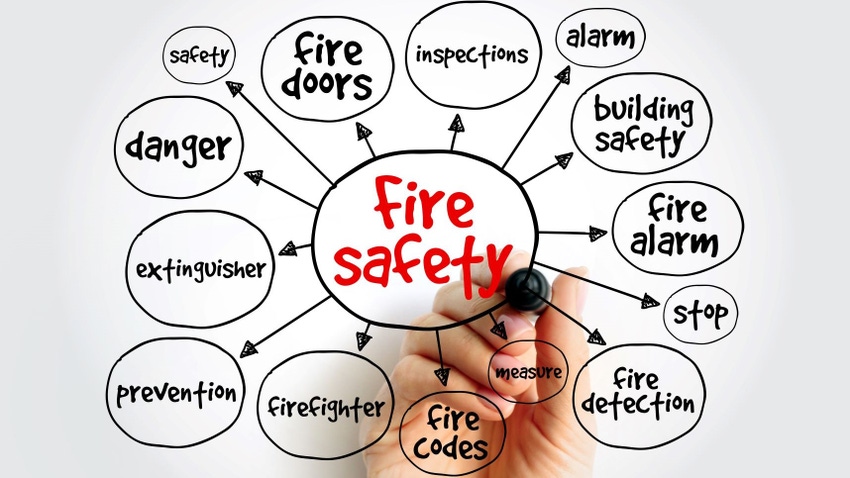Creating a Fire-Free Zone: Prevention and Safety Tips for Self-Storage Operators
A fire can be devastating for a self-storage business and its tenants, which is why it’s critical that facility operators take steps to improve safety and minimize risk. Following are some prevention and protection tips.

The chief service priority for self-storage operators is to keep customers’ belongings safe and secure from threats including fire, which can be devastating to the business and its tenants. To protect against potential incidents, you need strategic operational policies and procedures. You must also design and run the site to minimize risk. Following are strategies to help you prevent incidents of fire and maintain a safe environment if one occurs.
Tenant Education
Fires can start in many ways. While some may ignite due to nature, such as a lightning strike, most stem from human error. In self-storage, this means the biggest danger can be your tenants and the things they choose to store in their units. Thus, the best prevention measure is to educate them about safe storage practices.
Post signs that notify customers of harmful items that are prohibited on the property. These should include gas cans and gas-powered tools, chemicals, oil cans, dirty rags, propane tanks, and even camera film. Tenants often use their units as overflow space for their attic or garage and, in many cases, don’t realize that seemingly innocuous items can pose a serious fire hazard.
Of course, signage isn’t enough to fully deter the storage of improper materials, so it’s best to create a clearly stated policy in your self-storage rental agreement and communicate all risks at contract signing, so tenants understand what not to store and how to keep their units and belongings safe from fire. Provide them with a checklist of prohibited items. Though you may receive blowback, it’s critical to minimize risk. It’s always best to turn away a potential renter than have an issue with hazardous materials.
In addition to what’s being stored, how units are filled can pose a fire hazard. Thus, when someone rents a unit, it’s wise to discuss the amount of property they wish to store. Have a policy in place about how much is allowed in each unit. While it makes financial sense for a tenant to rent the smallest space possible, inform them about the dangers this can entail.
If you believe a customer has too much stuff for the space they want, be firm but informative as to why they need a larger unit. If the tenant intends to store paper documents, photographs, film and other valuables, recommend that they place them in a fireproof safe. You don’t need to turn people away from your facility, but it’s an effective preventive measure to inform them about the dangers overcrowding poses to their property and that of others
Staff Training
When creating a fire-prevention plan for your self-storage facility, it’s critical that employees understand every aspect of it. They must be aware of potential dangers on the premises. They also need to know how to identify issues with fire-safety systems in case they stop working properly.
By thoroughly teaching your prevention plan to employees, they’ll be able to relay the information effectively to tenants. This should prevent fires from occurring and help them understand what to do if one does ignite.
Protection
In case a fire occurs at your self-storage property, you need an effective suppression system in place to extinguish the flames or keep the blaze at bay until emergency responders arrive. There are two primary options to consider. The first is a water-sprinkler system, with heads in every unit, hallway and work area. The second is a dry-chemical system, which sprays a powder that coats the fire and breaks it down without wetting unit contents. The latter is the best, as it won’t cause further damage to customer belongings the way water will.
You should also place fire extinguishers 75 feet apart throughout the facility. It’s crucial to have them by all entrances and exits.
Storage facilities should also be equipped with heat monitors and smoke detectors. Hardwired, electronic detection systems will trigger the central alarm and alert the local fire station. This greatly speeds emergency-response times, which can make a big difference in saving your business and customer belongings. Some security systems can even integrate into your fire-protection system and be set up to send notifications to a smart device in case of emergency.
Finally, it’s imperative that you have fire insurance. Consult with your agent to ensure you have the right coverage for your business, as every self-storage facility is unique. Always make sure your policy is up to date and never lapses. Contact your agent every six months to discuss whether you need to make any changes. You should also discuss any actions you can take to lower your premium.
When it comes to fire safety, prevention should be top-of-mind for every self-storage operator. By putting sound policies in place that inform as well as direct customers and staff, you’ll help create a safe environment. Follow that up by installing critical safety systems that can minimize damage should an incident occur. In addition to these simple steps, obtaining fire-safety techniques and recommendations from your local fire marshal can go a long way toward strengthening your risk-management strategy.
Steve Lockwood is owner of Mountain State Fire Protection LLC, a Mesa, Arizona, business that offers fire-equipment inspections, sales, service and repairs. Steve has worked in the fire-safety industry for more than three decades and helped hundreds of commercial businesses meet fire-safety regulations. For more information, call 480.725.5243.
About the Author(s)
You May Also Like





